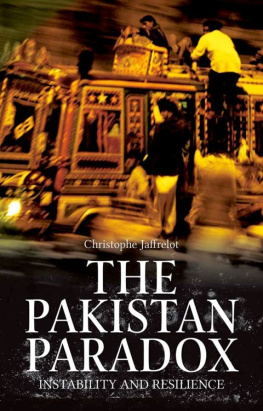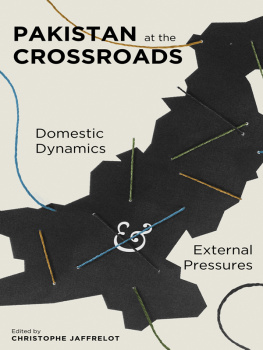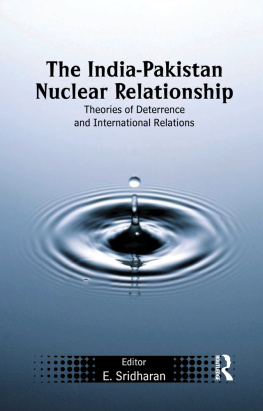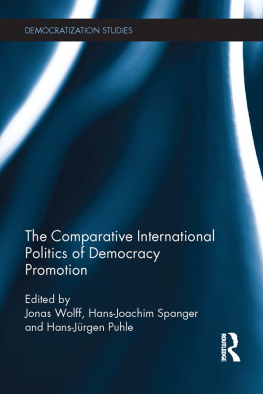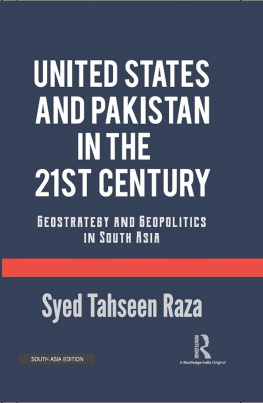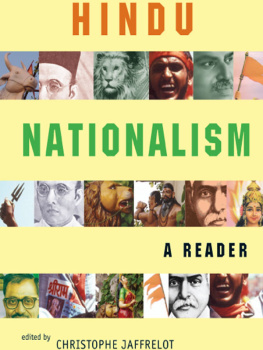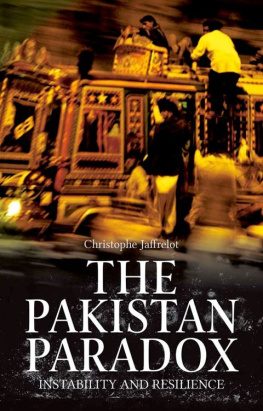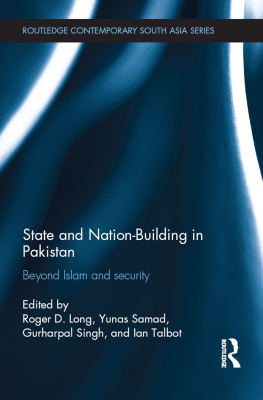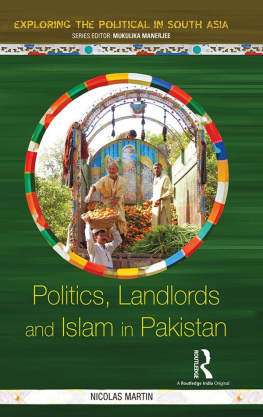THE PAKISTAN PARADOX
THE CERI SERIES IN COMPARATIVE POLITICS AND INTERNATIONAL STUDIES
Series editor, Christophe Jaffrelot
This series consists of translations of noteworthy manuscripts and publications in the social sciences emanating from the foremost French researchers at Sciences Po, Paris.
The focus of the series is the transformation of politics and society by transnational and domestic factorsglobalisation, migration and religion. States are more permeable to external influence than ever before and this phenomenon is accelerating processes of social and political change the world over. In seeking to understand and interpret these transformations, this series gives priority to social trends from below as much as to the interventions of state and non-state actors.
CHRISTOPHE JAFFRELOT
The Pakistan Paradox
Instability and Resilience
Translated by
Cynthia Schoch


Oxford University Press is a department of the
University of Oxford. It furthers the Universitys objective of excellence in research, scholarship, and education by publishing worldwide.
OxfordNew York
AucklandCape TownDar es SalaamHong KongKarachi
Kuala LumpurMadridMelbourneMexico CityNairobi
New DelhiShanghaiTaipeiToronto
With offices in
ArgentinaAustriaBrazilChileCzech RepublicFranceGreece
GuatemalaHungaryItalyJapanPolandPortugalSingapore
South KoreaSwitzerlandThailandTurkeyUkraineVietnam
Oxford is a registered trade mark of Oxford University Press in the UK and certain other countries.
Published in the United States of America by
Oxford University Press
198 Madison Avenue, New York, NY 10016
Copyright Christophe Jaffrelot, 2015
All rights reserved. No part of this publication may be reproduced, stored in a retrieval system, or transmitted, in any form or by any means, without the prior permission in writing of Oxford University Press, or as expressly permitted by law, by license, or under terms agreed with the appropriate reproduction rights organization. Inquiries concerning reproduction outside the scope of the above should be sent to the Rights Department, Oxford University Press, at the address above.
You must not circulate this work in any other form and you must impose this same condition on any acquirer.
Library of Congress Cataloging-in-Publication Data is available
Jaffrelot, Christophe
The Pakistan Paradox/Instability and Resilience
ISBN 978-0-19023-518-5
eISBN 978-0-19061-330-3
CONTENTS
Pakistan focuses the concern of quite a few chancelleries and international organizations today. Not only is it a nation that possesses nuclear weapons without having a stable political system, the military having held the reins of power on a number of occasions since independence in 1947, but it is also wracked by Islamist forces, many of which have links with the Afghan Taliban, Al Qaeda and possibly the Islamic State. A serious compounding factor, the civil and especially military authorities show considerable ambivalence with regard to certain Islamist groups that they view as allies against India in Kashmir, but also in Afghanistan, where NATO, now on its way out, has been mired in war since 2001 against the Taliban and groups based in Pakistan where Al Qaeda leaders are suspected of hiding.
Western fears about Pakistan have, however, been a poor advisor for sociological and political analysis, portrayals of the country too often being oversimplified. That is not to say that certain trends are not alarming, but in attempting to explain them, it is important to discard preconceived notions and avoid culturalist conflations. The present book sets out to decipher this complexity. It is not a work of field research per se, but an essay based on over fifteen years of familiarity with Pakistan.
I am most grateful to many friends and colleagues who have helped me to improve this book over the course of time. In Pakistan (and in Europe as well as in the United States where we have met repeatedly), I have benefited from the guidance of Mohammad Waseem over the last fifteen years. I also want to thank Tariq Rehman, Saeed Shafqat and Ayesha Siddiqa for the long discussions we have had on three continents. In the United States, I have learnt from Phil Oldenburg more than from anybody else during our seminars near The Cloisters. I am also most grateful to Hassan Abbas, Christine Fair, Frdric Grare, Sana Haroon, Farah Jan, Zia Mian and Aqil Shah for their comments on conference papers and during rich conversations. In the United Kingdom, in addition to my earliest guidesIan Talbot and Yunus SamadI am especially indebted to Farzana Shaikh for her deep understanding of Pakistan and her generous comments on my work, and to Michael Dwyer and David Lunn for their careful editing. Last but not least, in France, Mariam Abou Zahab has been an invaluable source of information and critique based on a truly erudite knowledge of Pakistans culture and politics. I also thank my friends Amlie Blom and Laurent Gayer for their enlightening essays, oral presentations and daily conversations. The making of this book has hugely benefited from the work of three remarkable experts: Elise Roy, from my French publishing house, Fayard, Miriam Prier, from my alma mater, CERI-Sciences Po/CNRS and Cynthia Schoch, my favourite translator!
Naturally, any mistakes and misinterpretations are mine.

The new nation was thus born with an image of India as a villain, a satan, and a monster next door, out to devour the newborn state. (Mohammad Waseem, Politics and the State in Pakistan, Islamabad, National Institute of Historical and Cultural Research, 1994, p. 99)
Since the beginning Pakistan has been confronted with the monumental task of formulating a national identity distinct from India. Born out of a schism of the old civilisation of India, Pakistan has debated over the construction of a culture of its own, a culture which will not only be different from that of India but one that the rest of the world can understand. (M. Ali, In Search of Identity, Dawn Magazine, 7 May 2000)
As the two excerpts above indicate, Pakistan was born of a partition that overdetermined its subsequent trajectory not only because of the difficult relations it developed with India, but also because this parting of ways defined the terms of its collective quest for identity. Indeed, the 1947 Partition was the outcome of an intense struggle as well as a trauma.
It grew out of the separatist ideology which crystallised at the end of the nineteenth century among the Urdu-speaking Muslim intelligentsia of North India, whose key figure was none other than Syed Ahmad Khan, the founder, in 1877, of the Anglo-Mohammedan Oriental College in Aligarh, a little town not far from Delhi. The Aligarh movementas it was to be remembered in historyturned to politics in the early decades of the twentieth century when it became the crucible of the Muslim League. This party, founded in 1906, was then separatist in the sense that it obtained from the British Raj a separate electorate for the Indian Muslims. The demand for a separate state emerged much later, in the 1940s, under the auspices of Muhammad Ali Jinnah, although in formulating it he did not outline the

